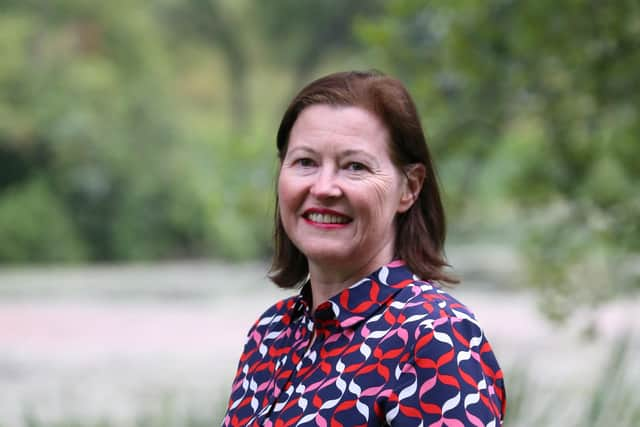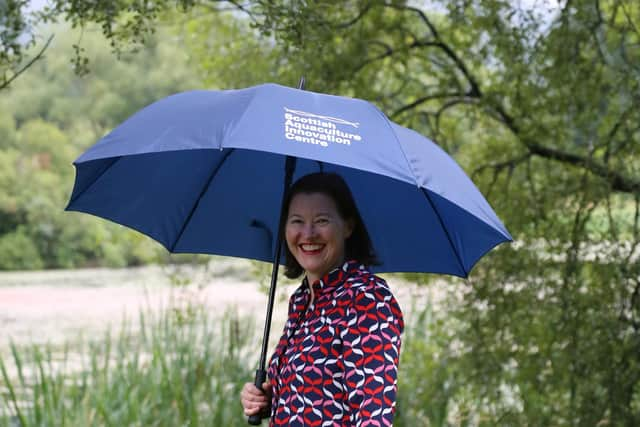The Big Interview: Scottish Aquaculture Innovation Centre chief executive Heather Jones


Heather Jones heads the Scottish Aquaculture Innovation Centre (SAIC), which last month announced it was looking to support the industry’s recovery from Covid-19 through a new innovation fund. The pandemic has been a significant challenge to the economy and aquaculture is no exception, with the centre looking to help the sector adapt to a “new commercial and operational reality in the months and years ahead”.
Can you explain what your role entails and what you aim to achieve?


Advertisement
Hide AdAdvertisement
Hide AdAs the chief executive of SAIC, my role champions innovation in aquaculture and builds links at the interface between the sector and academia. A key aim is helping applied research from Scottish universities and institutions to have real-world impact, in Scotland and beyond.
Last year we set out our strategy for phase two of SAIC which includes working with SMEs, nurturing skills and talent, and continuing to drive innovation and share knowledge. The collaborative research projects we support have a notable economic impact and contribute to the sector’s overarching ambition for growth – the industry plans to sustainably double its economic contribution from £1.8 billion in 2016 to £3.6bn by 2030.
During our first five-year phase, we helped to turn an initial project funding package of £6.75m into an applied research portfolio valued at £42.6m, spread across 47 collaborative initiatives In the next phase we hope to do even more to establish a low-carbon, hi-tech, data-rich and cutting-edge sector that builds on the existing foundations.
The organisation recently launched a funding call to support Scotland’s growing aquaculture sector through the continuing impact of the Covid-19 pandemic. Can you explain this?
The industry has been incredibly adaptable, continuing to produce healthy, nutritious protein throughout lockdown. It’s been a seminal example of organisations being flexible, creative and innovative. Changes to consumer eating habits and to international export markets have massively disrupted supply chains.
To build resilience for the future, there may be opportunities for Scottish businesses to service their local customers, not just in terms of the supply of food but also in terms of the infrastructure and hardware essential to run successful businesses.
As the population grows, the demand for protein-rich food sources will grow in tandem – how can seafood help meet that need?
Agriculturally-based protein supplies are finite and constrained by land available for farming. In contrast there is an untapped potential to increase farmed fish and shellfish production. Scotland has an abundance of marine and coastal resources, with the ideal conditions to farm Atlantic salmon in harmony with nature.
Advertisement
Hide AdAdvertisement
Hide AdThe “blue revolution” is about harnessing the power and potential of the world’s seas, rivers, lochs and oceans – for energy, for food and to harvest the organisms that grow there such as seaweed. The careful harvesting of natural resources, in a sustainable way, will help us not only to feed the world, but also to develop new biologically and ecologically sustainable ingredients.
You are doing an MSc in sustainable aquaculture – how rapidly has sustainability moved up the agenda, and what more needs to be done?
Sustainability has been on the agenda for decades but its importance is being recognised more and more. The issue of climate change is much better understood now, and there are ample opportunities for us to apply what we know to how we conserve and use global resources – of food, energy and water – sustainably.
For change to happen, though, political will and societal acceptability are crucial, as are practical steps to implement better ways of producing and consuming with less waste on both sides of that equation.
I firmly believe that aquaculture is a massive part of sustainable global food production. In developing countries, aquaculture can offer ways out of starvation and poverty for individuals and communities. And global trade in farmed seafood products supports the economic development of many emerging countries.
Sustainable aquaculture is all about farming responsibly. Over-exploitation in farming today harms the natural environment and the resources on which our ability to farm tomorrow depends. That’s why so much effort is being made to ensure Scottish aquaculture is one of the most sustainable forms of farming in the world.
Sharing knowledge is another big part of helping the sector to grow sustainably – transferring technical and technological know-how from company to company, country to country. I think better information supporting consumer choice can help deepen an understanding of what sustainability means in its broadest sense.
Tell us how your career progressed before your arrival at SAIC.
Advertisement
Hide AdAdvertisement
Hide AdI’ve had a varied career that started with the civil service graduate programme after university. I have also spent time working with the private sector in the US, as well as a stint in London working for a Scottish Office minister. Before I joined SAIC, I was a deputy director in the Scottish Government, where I had four fascinating roles – in one, I was responsible for aquaculture, freshwater fisheries, and marine licensing, which then led me to SAIC.
Across many of my roles, I’ve had amazing opportunities to work globally, particularly when I was responsible within the Scottish Government for international aid and “soft” diplomacy – using Scotland’s cultural assets to export our products, infused with Scottish provenance and values, and to attract overseas students and inward investment to come to Scotland.
You have extensive volunteering experience – what do you think the benefits of volunteering are?
I have enjoyed volunteering in several different contexts and have always found it to be a life-enriching experience. There is something special about engaging with others with no strings attached. It then becomes all about the relationships and the shared values and benefits of doing things with others who are also giving their time and energy too.
Voluntary work can sometimes be thought of as all about the “giving”, whether that’s time, energy or expertise. My reality has been that I’ve got so much more back in return. I’ve had some of the most fun, rewarding and memorable times in my life volunteering.
You were key in the formation of Women in Scottish Aquaculture, which launched on International Women’s Day last year – what is its purpose and what has it achieved?
WiSA is a networking group for women and men, all about promoting diversity. As well as encouraging more people to consider a career in aquaculture and targeting support to those at entry level, we also offer a range of services for women already working in the sector.
We want to celebrate the role of women, highlighting inspiring, positive role models for the next generation. We do lots of networking, in person and online, and recently ran our first mentoring scheme with 38 mentors and mentees involved.
Advertisement
Hide AdAdvertisement
Hide AdAt one of our first group meetings we were joined by First Minister Nicola Sturgeon, which was a fantastic endorsement of the vibrant, lively community we’ve created.
Networks like WiSA can be invaluable in providing the tools and skills to help women build successful careers, while also helping to promote the range of rewarding opportunities to the next generation of talent.
What would you like the SAIC to look like by, say, the end of 2021?
I’d like to welcome some younger faces into the SAIC team. They will likely bring a fresh outlook and different perspective with them. If we start working with new talent today, then we can help to build and develop the leaders of tomorrow.
SAIC champions gender equality in our sector and I hope to see that continue – our team is around 85 per cent female, compared with only 9 per cent in the wider aquaculture sector. I’d love to see more women working in the industry. A 50:50 split among new entrants would be such a positive step.
Within SAIC, and the Innovation Centre programme as a whole, the Scottish Government has created a superb model for collaborative innovation – between industries, academia and public sector organisations. It’s a model that works. And there’s nothing like the flattery of other countries recognising that and wanting to copy our success.
In aquaculture, we’ve had interest from the US, Canada, New Zealand and England, wanting to learn how to do what we do. And I know the other Innovation Centres are also widely regarded internationally as dynamic powerhouses of innovation and economic growth. So, my biggest wish for SAIC is that the government’s big-picture, forward-thinking approach to economic growth through collaboration continues well beyond the 2020s.
A message from the Editor:
Thank you for reading this story on our website. While I have your attention, I also have an important request to make of you.
Advertisement
Hide AdAdvertisement
Hide AdThe dramatic events of 2020 are having a major impact on many of our advertisers - and consequently the revenue we receive. We are now more reliant than ever on you taking out a digital subscription to support our journalism.
Subscribe to scotsman.com and enjoy unlimited access to Scottish news and information online and on our app. Visit https://www.scotsman.com/subscriptions now to sign up. By supporting us, we are able to support you in providing trusted, fact-checked content for this website.
Joy Yates
Editorial Director
Comments
Want to join the conversation? Please or to comment on this article.